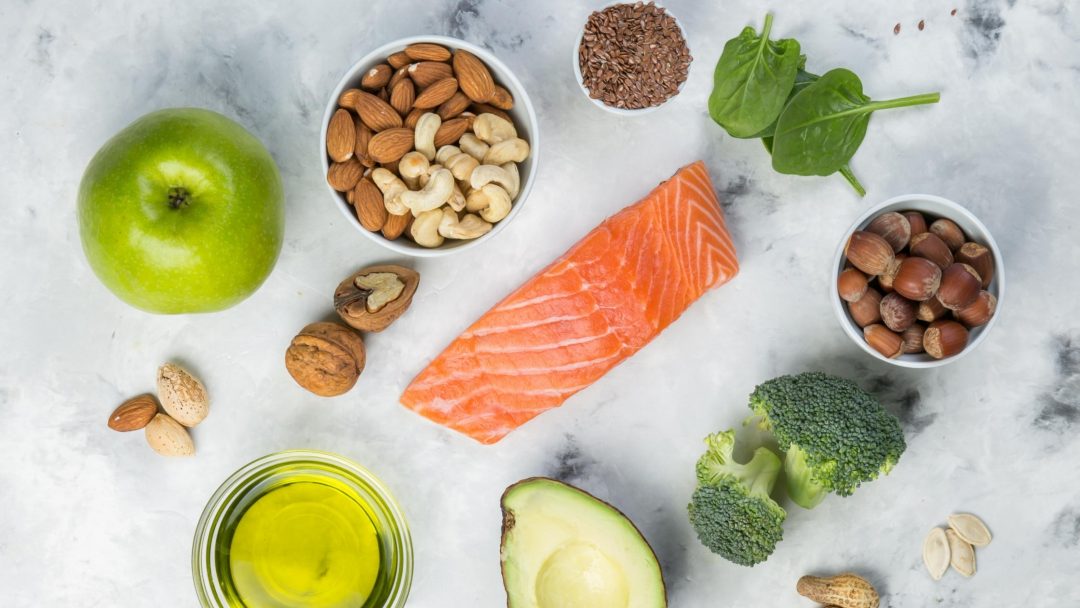Balanced nutrition is critical for immune function. There are 10 key nutrients that support your immune system. Probiotics, or healthy gut microbes, are also very important for immune system health. I always recommend trying to get key nutrients from food before going to supplementation. Whole-foods provide a more complete and complimentary nutrient profile than most supplements. Nutrients work together in a synergistic way to promote optimal wellness. Many nutrients are better absorbed in concert, or along with fat, as is the case with the fat soluble vitamins listed below. Keep reading to learn more about the top ten nutrients you need in your diet to support your immune health.
Many key nutrients can be toxic in high doses. Please consult your physician if you are considering supplementation, especially if you are taking medications, pregnant, breastfeeding, or have pre-existing conditions.
Essential Nutrients for Immune Function:
Vitamin A
Vitamin A is a fat soluble nutrient that plays an important role in both our innate and adaptive immune function. Beta-carotene, found in many plant foods, is a precursor to Vitamin A. It is important to note that due to genetics some individuals have a hard time converting carotenoids into Vitamin A. In these cases animal sources of Vitamin A are best, as no conversion is required.
Sources of Vitamin A
- Beef Liver
- Fermented Cod Liver Oil
- Salmon
- Organic Cultured Butter, if dairy is tolerated
- Sweet Potato
- Winter Squash
- Leafy Greens
- Carrots
- Red Bell Pepper
- Mango
- Cantaloupe
- Pink or Red Grapefruit

B Vitamins
B vitamins are water-soluble and act as coenzymes to catalyze many important processes in the body. The B complex vitamins are important nutrients for immune health, neurotransmitter production, nervous system function, mood, and digestive health. Liver function is also influenced by B Vitamin intake, as is red blood cell production, and DNA synthesis and repair. These important vitamins support the integrity of your mucosal lining in your mouth and digestive tract. They also promote the health of your hair, skin, and nails.
Vegetarians and vegans are at higher risk of deficiency in vitamin B12, which is most abundant in animal sources. Genetics can influence how your body is able to utilize B vitamins and may also lead to deficiency. In these cases it is especially important to make sure the diet is replete with B Vitamins.
Sources of B Vitamins
- Liver and Organ Meats
- Salmon/Oily Fish
- Trout
- Shellfish
- Poultry
- Pork
- Nutritional and Brewer’s Yeast
- Egg Yolks
- Nori Seaweed
- Dark Leafy Greens
- Broccoli
- Asparagus
- Brazil Nuts
- Pecans
- Walnuts
- Sunflower Seeds
- Pumpkin Seeds
- Avocado
- Figs
- Dates
- Sweet potatoes
- Peanuts
- Mushrooms
- Cabbage
- Fermented Foods
- Lecithin
- Whole-Grains (if tolerated)

Vitamin C
Vitamin C is probably the most quintessential immune-supporting nutrient that people think of when they think of nutrition and immunity. Known for its antiviral, antibacterial, and anti-histamine properties, Vitamin C is actually a complex of nutrients that act as antioxidants. This powerhouse nutrient acts as a potent anti-inflammatory and helps your body make more antibodies to fight pathogens. It is water-soluble and is probably one of the most unstable vitamins. Unfortunately, cooking can destroy much of this valuable nutrient, so it’s best to eat your food sources raw. Vitamin C is found in many plant-foods.
Smokers generally have much lower levels of vitamin C in their blood than non-smokers with the same intake, so if you’re a smoker consider upping your intake to make up for this deficiency.
Sources of Vitamin C
- Acerola Cherry
- Camu Camu
- Rose Hips
- Peppers
- Guava
- Papaya
- Kiwi
- Parsley
- Kale
- Thyme
- Broccoli
- Brussels Sprouts
- Strawberries
- Citrus
- Tomatoes
Cooking Vitamin C can destroy much of this valuable nutrient, so it’s best to eat your food sources raw.
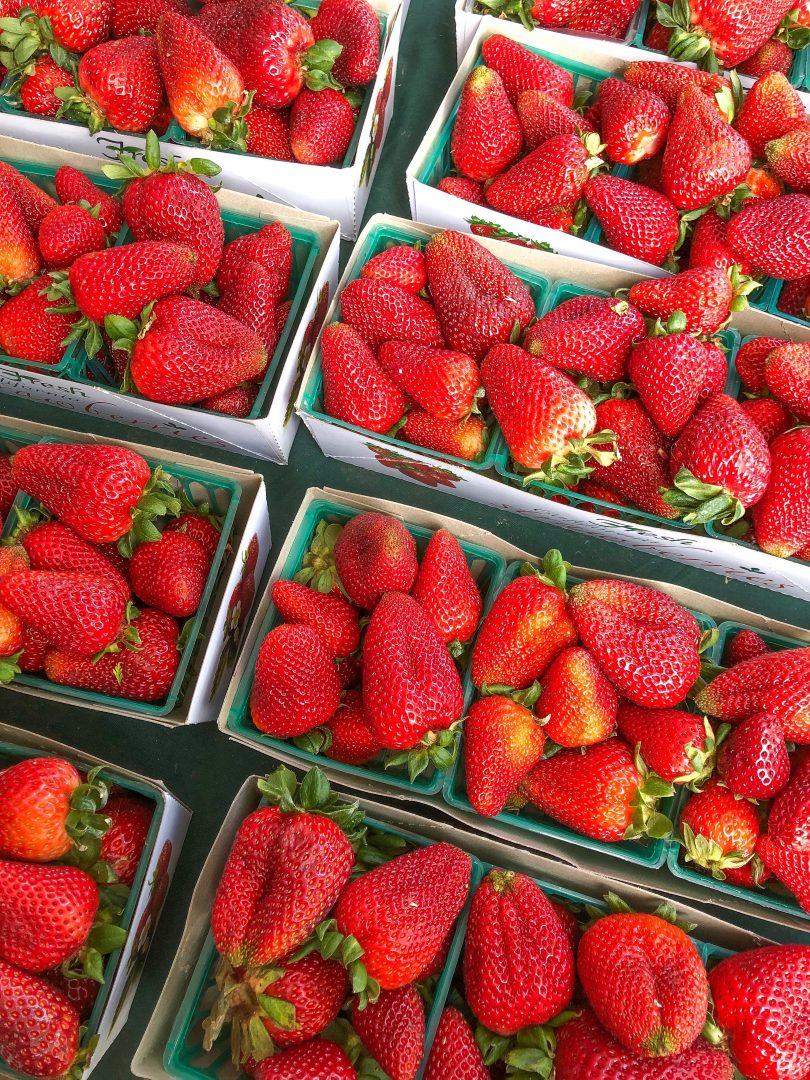
Vitamin D
Vitamin D is another one of the fat soluble nutrients that support immune health. It is known as the “sunshine vitamin” because it is manufactured in our skin when we are exposed to ultraviolet light from sunshine. As with Vitamin A, animal food sources are the most active and easily absorbed (depending on your individual health, of course). Since most of us don’t get enough sunshine to produce adequate levels of vitamin D throughout the year it is important that we monitor our vitamin D levels and try to optimize vitamin D consumption within the diet.
Sources of Vitamin D
- Liver
- Cod liver oil
- Egg Yolks
- Fatty Fish
- Organic Cultured Butter, if tolerated (opt for organic to avoid pesticide exposure)
- Mushrooms
- Leafy Greens
Vegetarians and Vegans must pay special attention to this nutrient as it is difficult to obtain from plant foods. Mushrooms are the best vegan option.
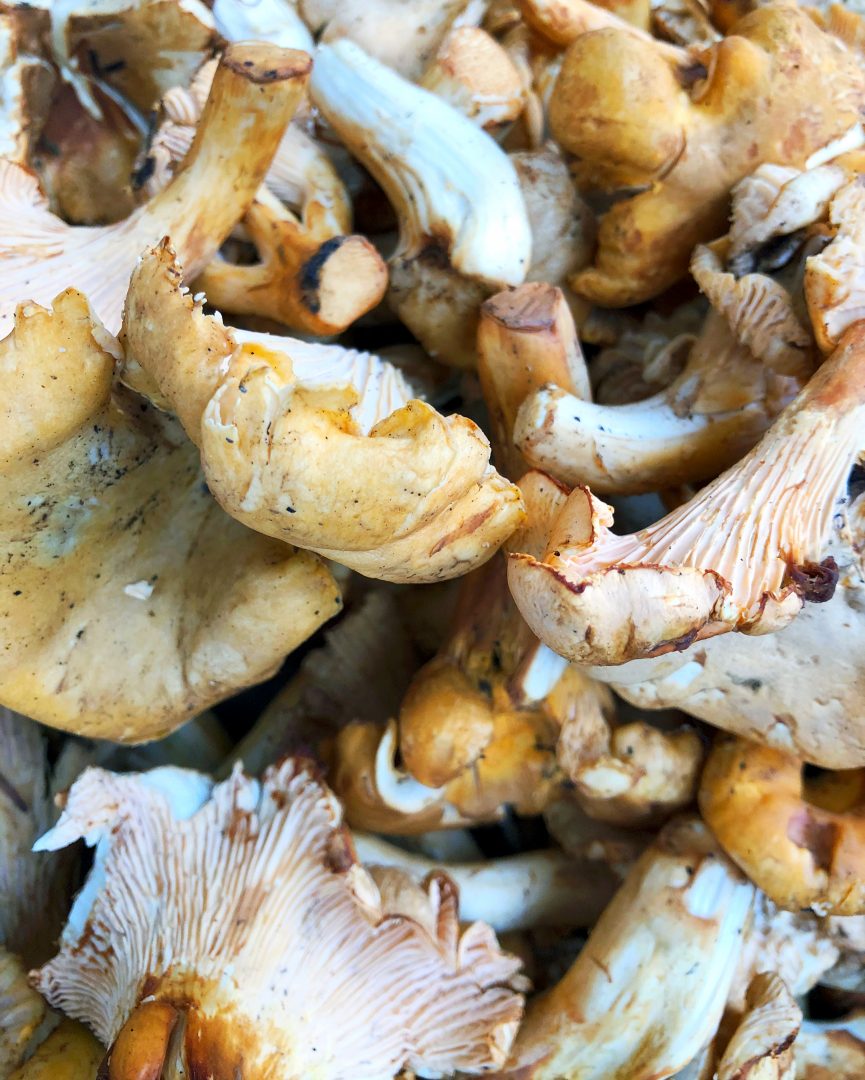
Vitamin E
Vitamin E is another one of our fat soluble nutrients for supporting immune health. The primary function of vitamin E is to act as an antioxidant in the body. One way Antioxidants support immune function is by helping to reduce chronic inflammation in the body. Vitamin E also helps stabilize cell membranes and is important for lung and cardiovascular health. The best sources of Vitamin E are plant-based.
Sources of Vitamin E
- Sunflower seeds
- Almonds and Almond Oil
- Hazelnut and Hazelnut Oil
- Salmon
- Dark Leafy Greens
- Papaya
- Bell pepper
- Asparagus
- Rice Bran and Rice Bran Oil
- Palm Oil
- Avocado
The efficacy of vitamin E is enhanced by other antioxidants such as vitamin C, vitamin A, glutathione, coenzyme Q 10, and selenium.
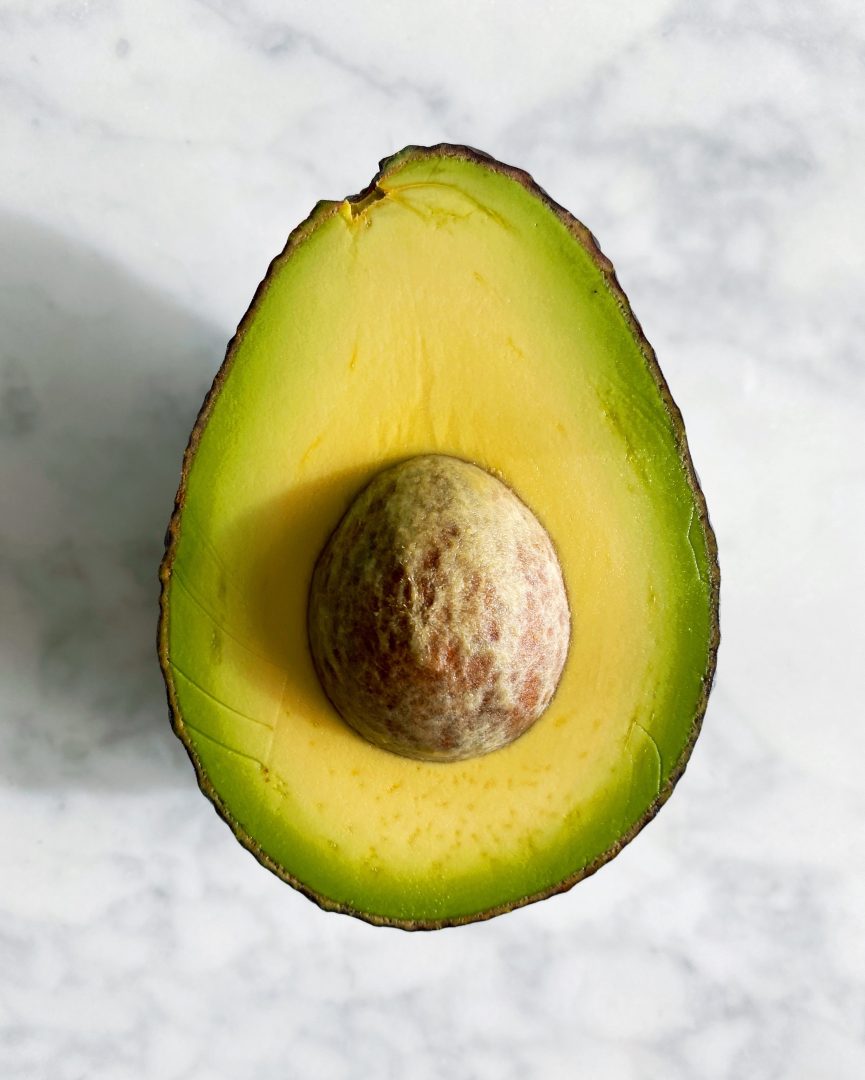
Iron
Iron is an essential mineral the primary function of which is the formation of hemoglobin, the central oxygen carrying component of the red blood cell. This blood-building mineral has been found to be one of the most important nutrients in immune health and low iron levels may inhibit the body’s ability to kill microorganisms. Vegetarians and vegans are at higher risk for deficiency, so it is one of the nutrients to which they should pay special attention. Menstruating women generally have higher iron requirements than men, especially if they suffer from fibroids, or heavy periods.
There are two forms of dietary iron: heme iron from animal sources, and non-heme iron from plants. Heme iron is generally better absorbed. Iron absorption improves when taken along with vitamin C, so pair your iron rich foods with your vitamin C rich foods for a beneficial synergistic effect. Iron can be toxic in high doses, so please use caution and check your levels if you’re planning on supplementation.
Sources of Iron
- Red meat
- Liver and organ meats
- Salmon & Shellfish
- Pumpkin seeds
- Dark Chocolate
- Spinach
- Chard
- Kale
- Dandelion Greens
- Prunes
- Broccoli
- Asparagus
- Quinoa (if soaked and prepared to maximize nutrient absorption)
- Legumes (if soaked and prepared to maximize nutrient absorption)
- Soy (I only recommend soy if it’s fermented, organic, non-GMO, and traditionally prepared)
Pair your iron rich foods with your vitamin C rich foods for better absorption and a beneficial synergistic effect.

Magnesium
Magnesium is one of the most important nutrients for immune health and overall wellness. It has a strong influence on immune function with both innate and acquired immunity. This essential mineral is involved in over 300 bio chemical processes in your body. It helps your muscles contract, supports your nerves, and keeps your heart beating. Most dietary sources of magnesium are plant-based, and it is one of the minerals that has decreased in our diet due to soil depletion. Other sources of magnesium deficiency may be due to digestive disorders, such as chronic diarrhea, or celiac disease. Certain medications can impact magnesium absorption as well.
Sources of Magnesium
- Pumpkin Seeds
- Flax Seeds
- Chia Seeds
- Dark Leafy Greens
- Sesame Seeds
- Cashews
- Brazil Nuts
- Almonds
- Dark Chocolate
- Avocados
- Fish
- Bananas
- Potatoes
- Legumes
- Whole Grains
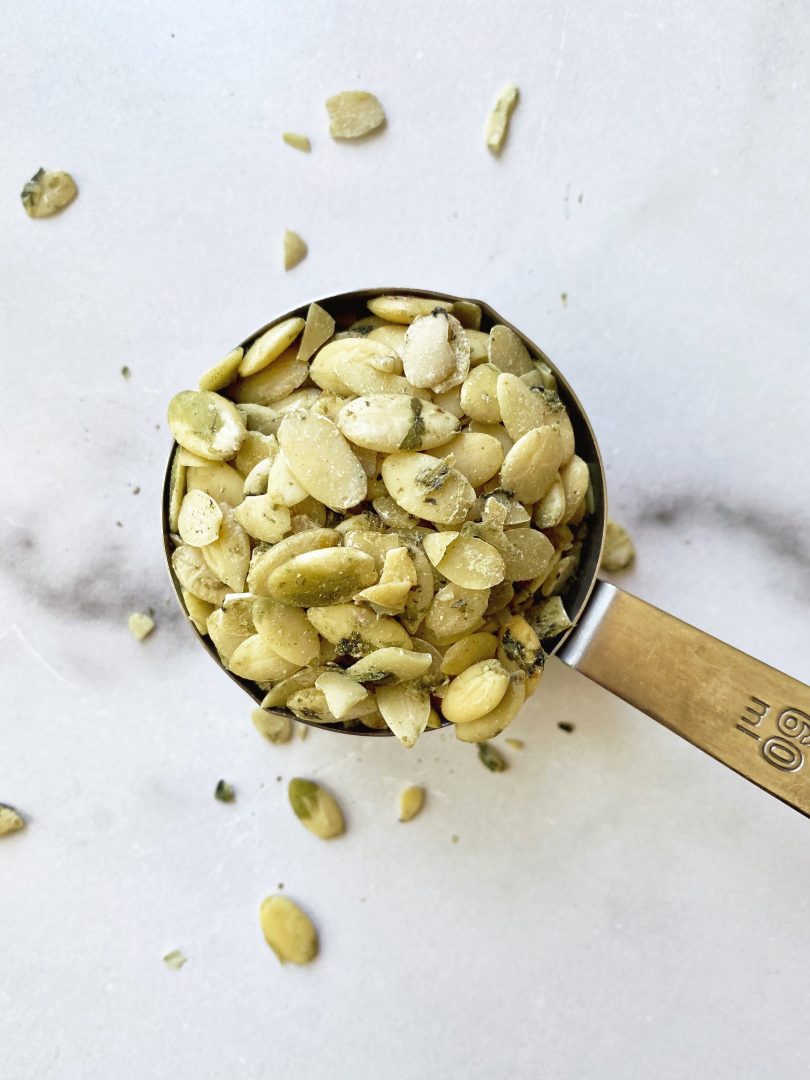
Selenium
Selenium is an essential mineral that acts as an antioxidant in your body. As with many nutrients, selenium works in conjunction with other nutrients that support immune health, such as vitamin E. Selenium and Vitamin E do more to support your immune system together than they do alone. This synergistic effect is common with nutrition. I always recommend trying to get your nutrients from whole-foods instead of supplements for this reason. Soil depletion is a factor with selenium, as it is with zinc. The soil where your food is grown may or may not have adequate levels of selenium.
Males have a higher need for selenium than females, as it is important for their fertility.
Sources of Selenium
- Brazil Nuts
- Fish
- Meat
- Eggs
- Sunflower seeds
- Mushrooms
- Spinach
- Cashews
- Brown Rice and Oatmeal, if grains are tolerated (soaked and prepared to maximize nutrient availability)
Brazil nuts are rich in selenium. One nut can contain 175% of the RDI.
Healthline
Zinc
Zinc is one of the most important nutrients for immune health. This mineral is essential for possibly more key functions in the body than any other mineral. It is critical for wound healing and immune function. This key nutrient is also important in helping your body utilize vitamin A, and may provide anti-inflammatory benefits. It boosts antibody response, and can improve cell-mediated immunity by helping with the function of white blood cells.
Deficiency in zinc is fairly common as our soils have become depleted of this nutrient. Soil depletion leads to subsequent reduction of the nutrient density of our food. That is one reason why I prefer to buy organic produce. Organic farms usually have healthier soil. In fact, I once had an organic farmer tell me that he doesn’t tend the plants, he tends the soil, with good soil the plants tend themselves.
Zinc is best absorbed from animal foods, so it is important that vegetarians and vegans pay special attention to getting enough plant-based sources of this nutrient.
Sources of Zinc
- Oysters and Shellfish
- Meat
- Seeds, especially pumpkin seeds
- Nuts, especially pecan and Brazil
- Egg Yolks
- Dark Chocolate
- Legumes and Gluten-Free Whole-Grains, if tolerated (I only recommend these as a source if properly soaked and prepared for better nutrient availability)
Oysters and Liver get gold stars in nutrition for being high in many key nutrients that support immune health.
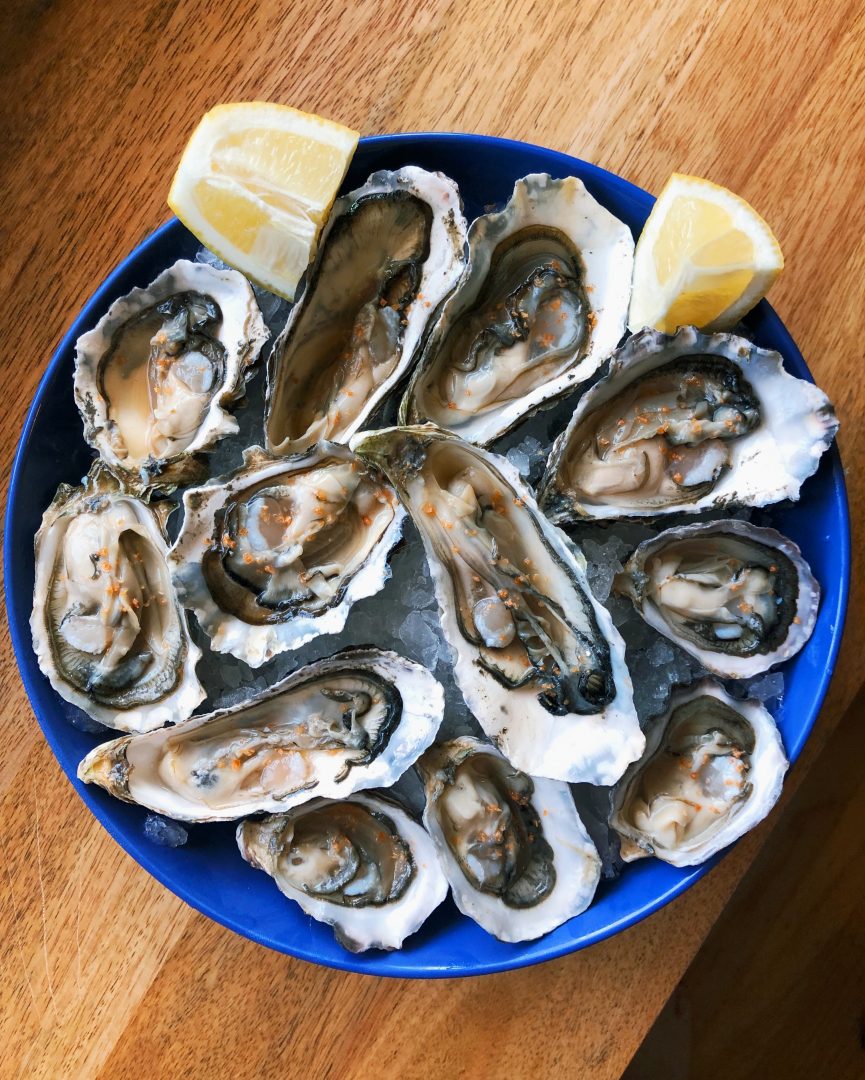
Essential Fatty Acids
Essential fatty acids are last on our list of nutrients that support immune health. Eating the right types of essential fatty acids in the right ratios is important for overall health and wellness. Healthy essential fatty acid balance will reduce inflammation in your body and promote overall cellular integrity. In the typical Standard American Diet we eat too many omega-6 essential fatty acids and too few omega-3 essential fatty acids. You can tip the scales in the right direction by increasing your consumption of omega-3 essential fatty acids and being mindful to avoid overconsumption of the omega-6 EFAs.
Vegans and vegetarians must work harder to make sure they have sufficient amounts of Omega 3 Fatty Acids in their diet. Research has shown that supplementation with omega-3 essential fatty acids is less effective than dietary consumption.
Sources of Essential Fatty Acids
- Fatty fish: Salmon, mackerel, anchovy, sardine, herring
- Oysters
- Cod liver oil
- Grass-fed/Grass-Finished or Pasture-Raised meat
- Pasture-Raised Egg Yolks
- Seaweed and Algae
- Chia Seeds
- Flax Seeds
- Hemp Seeds
- Walnuts
Learn how to build nutrient-dense meals that support immune health with my easy step-by-step formula for healthy eating.
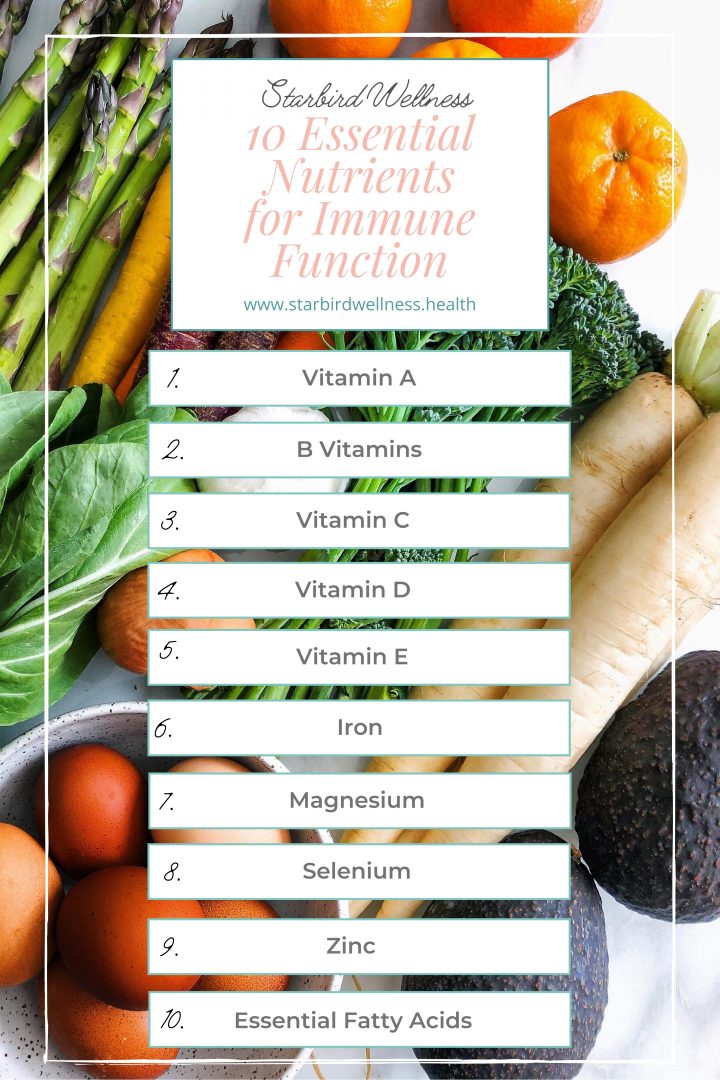
Join my Facebook Community for more tips to support your everyday wellness.

